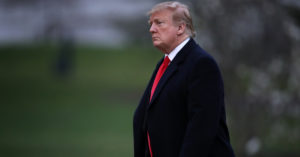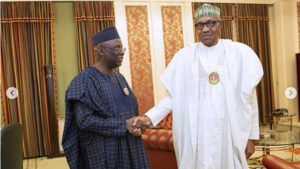
Nigeria’s president, Muhammadu Buhari, has recounted his meeting at the White House with President Donald Trump of the United States sometimes ago during which they discussed the incessant persecution and killings of Christians.
Buhari, who spoke at the end of the two-day retreat of ministers and top government officials in Abuja September 8, said Trump asked him why he (Buhari) was persecuting Nigerian Christians during the meeting.
“I believe I was about the only African among the less developed countries that the president of the United States invited. And when I was in his office, only he and myself, he looked at me in the face and said why are you killing Christians, if you were the one, I wonder how you will react. I hope what I was feeling inside did not betray me before him, so I understood it,” Buhari said after delivering his prepared speech at the retreat.

“The problem between cattle rearers and stagnant farmers, which is older than me not to talk of him (President Donald Trump), because I know I am a couple of years older than him, were happening. It’s climate change with population growth and the misunderstanding of the culture of the cattle rearers.
“If you have 50 cows and they eat grass or something, any route to their water pond they will follow it, it doesn’t matter whose farm it was. The First Republic set of leaders were the most responsible leaders we’ve ever had. They had a gazette in the early 60s, which delineated the cattle routes and the grazing areas. They used meagre resources then to put water dams, windmills…
“So any cattle rearer who allowed his cattle to somebody’s farm was arrested, taken before a court, the farmer is called to submit his bill then the judge will say if a cattle rearer couldn’t pay, his cattle were sold and the farmer is paid. But subsequent leaders, the VIPs, encroached on the cattle routes, they took over the cattle rearing areas.
“There was a time I went to Bayelsa State and I saw cattle rearers there, so I suspected they were going into the Atlantic.
“So I tried and explained to him (Trump) that this has got nothing to do with ethnicity or religion. It’s a cultural thing,” he said.
In January, Open Doors, in a report, ranked Nigeria 12th among the 50 nations of the world where it is difficult to practice Christianity due to persecution.
The 2020 Watch List, unveiled in Washington on January 15 by the group, listed 16 other African nations, where it is hardest to follow Jesus Christ, the son of God.
Of these countries, Nigeria ranks 5th, coming behind Somalia, Libya, Eritrea and Sudan.
Other Africa countries listed are Egypt, Algeria, Mauritania, Central Africa Republic, Morocco, Burkina Faso and Mali.
Nigeria remained the most violent country in the world where Christianity is practised as far as Open Doors data could track.
“The difference this year is primarily because, in Nigeria, Boko Haram has changed tactics. They have gone from assassination and these kinds of things to roadside assaults on Christians and Kidnappings. So we have seen a jump in those kinds of things. But Boko Haram is also spreading its wings into Cameroon and into Chad but also into Burkina Faso,” the group said.
In June, Some British parliamentarians under the aegis of All Parliamentary Group for International Freedom of Religion or Belief (APPG) launched a report on persecution of Christians in Nigeria.
The report, which was launched in the House of Commons in London, chronicled findings on persecution of people of Christian faith in Nigeria and also made recommendations to tackle the menace.
The UK All-Party Parliamentary Group for International Freedom of Religion or Belief (APPG) is a group of over 100 British Parliamentarians from different political parties and from both Houses of Parliament.
It exists to promote Article 18 of the Universal Declaration of Human Rights which states that “Everyone has the right to freedom of thought, conscience and religion.”
The group, in the report, flayed the growing power and influence of Islamist extremism across the sahel.
In July, a group, International Society for Civil Liberties and Rule of Law, in a report said no fewer than 1,200 Christians were killed in the first half of 2020.
It said the killings were carried out by Islamist militants and members of predominantly Muslim Fulani group.
The group said 390 of the victims were slaughtered by the Boko Haram and the Islamic State West Africa Province, both of which have links with ISIS while the Fulani herdsmen killed 812 others.
It further said the herdsmen targetted Christian farming communities.
In the same month, Frank Wolf, a former U.S. lawmaker and genocide expert, warned that Nigeria might become another Rwanda and Dafur (Sudan) if its authorities failed to check the persecution of Christians in the country.
Christian Post reports that Wolf, who represented Virginia in the Congress, spoke when he joined Genocide Watch’s Greg Stanton, Nigerian bishops and other religious freedom advocates on a Zoom call with reporters.
He said, “Almost daily reports show increasing violence and death in Nigeria. And implosion of Nigeria will destabilise the surrounding countries and send millions of refugees into Europe and beyond.”
A Nigerian church, Ekklesiyar Yan’uwa a Nigeria (EYN), also in July, said it lost more than 8,370 members to the Boko Haram Insurgency in the north eastern part of the country.
It said eight pastors were among those it lost.
EYN is an Anabaptist Christian denomination with more than 100,000 members.
The church, also known as Church of the Brethren in Nigeria, said 25,000 of its members were currently taking refuge in neighbouring Cameroon, while more than 700,000 were in Internally Displaced Persons (IDPs) camps.
The church, which spoke through its president, Reverend Joel Billi, at a news conference said the activities of the terrorists had affected more than 1.5 million members, and caused huge damages to the church’s places of worship in the North East region.
He said it was the single largest Christian denomination that was worst hit by the activities of the Boko Haram terrorists.


